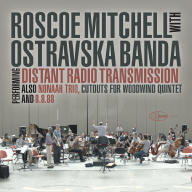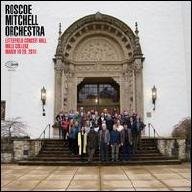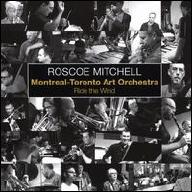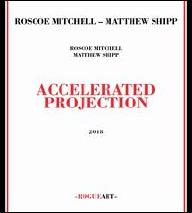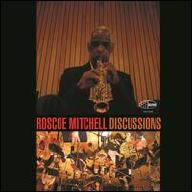Born in 1940 in Chicago, Illinois, Mitchell played saxophone and clarinet as a teenager. While stationed in Germany as a member of the Army, he played in a band with tenor saxophone innovator Albert Ayler. Upon returning to the U.S. in 1961, Mitchell played bop with a group of Wilson Junior College students who included bassist Malachi Favors and saxophonists Joseph Jarman, Henry Threadgill, and Anthony Braxton. Mitchell began listening to the recordings of Ornette Coleman and John Coltrane. He studied with pianist/composer Muhal Richard Abrams. In 1962, he began playing in Abrams' newly organized Experimental Band, a rehearsal group that explored many of the contemporary alternatives to conventional jazz improvisation and composition.
In 1965, he became one of the first members of the Association for the Advancement of Creative Musicians (AACM), a nonprofit organization established by Abrams, pianist Jodie Christian, drummer Steve McCall, and composer Phil Cohran. The AACM were devoted to the same principles as the Experimental Band. In 1966, Mitchell's sextet (with trumpeter Lester Bowie, tenor saxophonist Kalaparusha Maurice McIntyre, bassist Favors, trombonist Lester Lashley, and drummer Alvin Fiedler) became the first AACM group to record. Abstract in concept and execution, the album Sound (Delmark) was an in-depth examination of the interaction between sound and silence, utilizing such unorthodox devices as spontaneous collective improvisation, toy instruments, and non-musical noise. A departure from the more extroverted work of the New York-based free jazz players, Sound pointed the way to a new manner of playing jazz-based music. Around this time, Mitchell also performed and recorded as a solo saxophonist. By 1967, the Roscoe Mitchell Art Ensemble consisted of the leader, Favors, trumpeter Lester Bowie, and drummer Phillip Wilson. That combination did not record; Wilson was replaced by Jarman, and in 1969 the group traveled to Europe. The sojourn was very successful. The band -- renamed the Art Ensemble of Chicago -- recorded extensively, particularly in France. The resulting albums formed the initial basis of their reputation.
Mitchell played briefly in St. Louis upon returning to the United States in 1971. He then resettled in Chicago. Around 1974 he established the Creative Arts Collective. Based in East Lansing, Michigan, the group was similar in purpose to the AACM. The '70s found Mitchell expanding on his solo saxophone concept, working with his AACM cohorts in various combinations and performing with the Art Ensemble. The latter group became possibly the most highly acclaimed jazz band of the next two decades, winning critics' polls with regularity. Mitchell also began releasing more albums as a leader during the '70s, including 1974's Solo Saxophone Concerts, 1975's Quartet, and the 1977 double-album Nonaah, featuring Anthony Braxton, Malachi Favors, Muhal Richard Abrams, Henry Threadgill, and others.
The '80s were also a prolific time for Mitchell and saw him continue his work with the AACM and deliver a handful of well-received albums on Black Saint including 1983's Roscoe Mitchell and the Sound Space Ensembles, 1986's The Flow of Things, and 1987's Live at the Knitting Factory with trumpeter Hugh Ragin, guitarist A. Spencer Barefield, bassist Jaribu Shahid, and percussionist Tani Tabbal.
In the '90s, Mitchell branched out even more, collaborating more frequently with such classical composer/performers as Pauline Oliveros and Thomas Buckner. A trio with Buckner and the virtuoso pianist Borah Bergman was an ongoing and effective unit. He also led the Sound Ensemble, featuring members of his Creative Arts Collective. Also since the '90s, Mitchell has performed and recorded extensively as the leader of his Note Factory ensemble, a group ranging in size from a sextet to a nonet; Note Factory albums include 1993's This Dance Is for Steve McCall and 1999's Nine to Get Ready.
Since 2000, the saxophonist has remained extremely active, releasing a regular stream of recordings with his various ensembles including 2002's Song for My Sister, 2003's Bad Guys, 2004's Solo 3, and 2007's Samsara. In 2010, he delivered the live album Far Side on ECM. He then paired with drummer Tyshawn Sorey and trumpeter Ragin for a 2013 duets album and joined Pauline Oliveros, John Tilbury, and Wadada Leo Smith for 2014's Nessuno. A year later, he reunited with drummer Jack DeJohnette and fellow AACM members pianist Muhal Richard Abrams, bassist Larry Gray, and saxophonist Henry Threadgill for the much-lauded concert album Made in Chicago.
In 2017, Mitchell delivered Four Ways, a studio collaboration with the Yuganaut trio featuring Stephen Rush, Tom Abbs, and Geoff Mann. That same year, the live Bells for the South Side was issued by ECM. A double-length album, it was commissioned by and recorded at Chicago's Museum of Contemporary Art. The historic date marked the first time that Mitchell had contrasted and combined simultaneously the sounds and strategies of his four concurrent working trios. Another collaboration, Ride the Wind, featuring the Montreal-Toronto Art Orchestra, followed in 2018. That same year, ECM celebrated the AEC's 50th anniversary with a 21-CD box entitled The Art Ensemble of Chicago and Associated Ensembles, that compiled all the group's recordings for the label as well as solo offerings by its members and associates. Also in 2018, he paired with trombonist George Lewis for a live concert recorded during Berlin's CTM Festival; the results appeared the following year as Voyage and Homecoming.
In August 2019, Wide Hive released Littlefield Concert Hall, Mills College. Recorded live with a large orchestra, its members were handpicked by the composer. In August 2020, Mitchell released two albums simultaneously for Bologna, Italy's I Dischi di Angelica, a music festival label that exists solely to issue recordings from its performances. Nessuno captured a 2011 improvised collaborative outing between Mitchell, Pauline Oliveros, John Tilbury, and Wadada Leo Smith. Splatter, recorded in 2019, offered Mitchell's collaboration with vocalist Thomas Buckner and the Orchestra del Teatro Comunale di Bologna, directed by Tonino Battista. 2021's Dots/Pieces for Percussion and Woodwinds, on Wide Hive, captured a series of 2020s shorter pieces. ~ Chris Kelsey, Rovi




